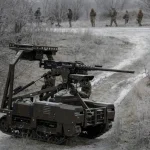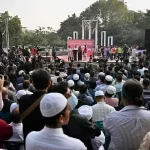LAHORE: JUI-F head Maulana Fazlur Rehman encouraged party members to ensure the success of Jamaat-i-Islami’s statewide shutter-down strike on Wednesday (today) and declared support for it on Tuesday.
Maulana Fazl, who was presiding over a preparatory meeting for a Khatm-i-Nabuwat (PBUH) conference, stated that the government has been making life more and more difficult for the average person. He bemoaned the unsupportable levels of price increases and taxes, attributing them to the International Monetary Fund’s (IMF) orders.
In addition to joining the strike, he said, “JUI-F fully supports the strike call and workers and business forums of the party should make this peaceful strike a success.”
Afterwards, Maulana Fazl paid Chaudhry Shujaat Hussain, the leader of the PML-Q, a visit to find out how he was doing. The two leaders talked about the nation’s present political and economic climate, according to a news release from the party.
The statewide shutter-down strike on Wednesday, according to JI emir Hafiz Naeemur Rehman, will be a decisive step to put pressure on the government to provide relief to traders and the general population.
Speaking to the media while visiting the party’s Hall Road camp, Mr. Rehman advised traders to stick together since defense of the public’s rights and their own depend on it. He reaffirmed his determination to hold the administration responsible for the compromise struck after their protest, which lasted for 14 days.
The Hall Road camp was established by the JI as a focal point for rallying the public and traders to support the strike. Mr. Rehman spoke with members of many trade associations, all of whom vowed to fully back the JI’s demand for a countrywide strike.
The JI emir denounced as harmful to traders the government’s recently suggested “trader-friendly [tajir dost]” program. In contrast to equitable, income-based taxation, he argued, the government’s proposal to levy taxes based on market evaluations is unfair and intolerable. Despite their willingness to contribute to the expansion of the tax base, traders vehemently disagree with what they see as an unfair and unjust system.
He urged the ruling class to cut back on their extravagant spending and tax feudal lords in order to increase exchequer earnings. According to him, the JI has already suggested actions to boost the economy and protect the interests of the general public and traders. He lamented that the government, which already burdened the impoverished, salaried class, and business community, was unwilling to make the required judgments.
Mr. Rehman emphasized the need for a nonviolent resistance campaign in order to promote public relief, which led the JI to declare the strike following talks with traders. He made hints that JI will discuss its future plans with traders and that, should the government continue to be uncooperative, it may announce additional strikes.
The head of JI also issued a challenge to Nawaz Sharif, the former prime minister, demanding that he reveal the full amount of the Sharif family’s gains from the national coffers through capacity charges on their independent power plants (IPPs).
He chastised Mr. Sharif for trying to project a heroic image while providing Punjabis with what he called insignificant respite in the face of skyrocketing electricity bills. If the Sharif family and their allies waived the capacity charges they receive from their IPPs, he said, the entire nation might benefit from lower electricity rates.
Mr. Rehman restated JI’s demand for a national electricity tariff cut and insisted on an IPP forensic audit. He made a call to action for the people to help make the strike a success.
The JI emir denounced individuals who target innocent people because of their ethnicity as agents of foreign agendas attempting to destabilize Pakistan and denounced the recent terrorist assaults in Balochistan. He emphasized that the government must safeguard its people and called for tough action against such elements involving the real leadership of Balochistan.








